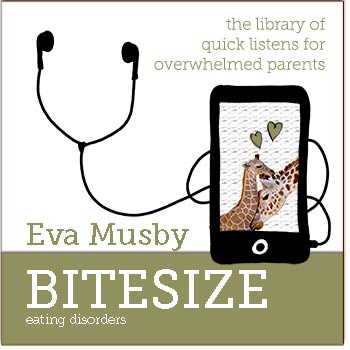Where's the help, when someone with an eating disorder cannot eat enough at home?
People with an eating disorder must eat to recover. Whether they're children, adolescents, or adults, they have to manage meals. With anorexia, there's refeeding for weight-recovery, and with all eating disorders, people need a period of help with regular meals.
With children and teens with an eating disorder, parents are central to this. But where's the help when parents can't get their child to eat?
And because parents are human, where's the help when they are exhausted and overwhelmed?
Ideally, all this comes from your treatment team. But that's not reality for many families.
Showcasing a company that supports meals at home
Today I want to share my excitement about a team of professionals that will help your child with an eating disorder, whatever their age, wherever you are in the world, to eat and manage meals.
The service is UK company Eating Disorders Home Care. I started paying attention when a parent told me how an eating disorder expert from the Eating Disorders Home Care had supported their daughter for six meals a day by video call… and how wonderful it had been.
I've been speaking with the company's director Sophia Vieira, and I am well impressed. Here's what I picked up. This is not an advert, not an endorsement — I'm just sharing my excitement so you can go check things out for yourself.
Meal support, for any age, wherever you are
Sophia Vieira tells me they've been supporting people age 8 to 75, in various countries. It could be 6 meals a day, it could be less — whatever the person is needing.
The person is allocated a small team of professionals who will get to know them well. Sophia gave me the example of a girl who loves cats, and so everyone on her team is a cat owner and they talk about cats at every meal.
Coaching towards normal life
It's crucial that our children get coaching and practice towards normal life (you may recognise this as 'Phase 2' of family-based treatment (FBT) and as it's a much-neglected phase, I do a workshop on it).
Sophia Vieira gave me some inspiring examples of how they work to move the person on, so that their need for the service reduces with time. For instance, if your child finds it hard to eat in a restaurant, their team member may be supporting them discretely through an earpiece.
Coaching the parents to succeed with meals
You know me, I'm very keen on parents getting the coaching they need to get their child to eat. Sophia Vieira tells me that parents can observe how the professionals are supporting their child's meal, so that they can succeed in more meals themselves. They can also feed their child while the professional observes and gives feedback. So precious!
Sophia and members of her team have come to my workshop "First phase: help your child to eat" and it was great to share tips. I was well impressed by everything Sophia contributed.
What is the Eating Disorders Home Care group?
They are a multidisciplinary and multi-ethnic specialist team comprising Dietitians, Nurses, Mental Health Nurses, Therapeutic Care Workers and Social Workers, with access also to the expertise of Consultant Psychiatrists, Psychotherapists and Clinical Psychologists. Sophia Vieira tells me everyone has several years experience in eating-disorder work, and works some of their time in eating-disorder units or outpatient eating-disorder services.
They work with you as parents, with your child's treatment team.
Their main purpose is meal support, but there can also be consultations with their dietitians or mental health professionals, as required.
Funding
They take both private clients and those funded by the UK national health service (NHS): some NHS Trusts have a contract with Eating Disorders Home Care to support patients in transition from hospital to home, or from adolescent (CAMHS) to Adult services.
In the UK, those who were sectioned under the Mental Health Act are entitled to this type of support as they leave hospital, under Section 117 Aftercare of the Mental Health Act.
Don't just take my word for it
I want to very cautious about recommending any particular professional or company, even when parents have spoken about them enthusiastically. Some professionals are great for some families but not good for others. So please only use my words as a starting point and find out more for yourselves.
And of course make sure your treatment team is on board. Everything in treatment needs to be joined up, consistent.
I absolutely take no payment from this company — I'm only writing about them to serve you, dear parents, who are in need of options. (I do sometimes get paid by professionals for work I do for them — never to promote them: more here.)
If you know of other similar meal support services, you are welcome to inform others by typing in a comment below — and again, it's information, not endorsement.
And also: eating disorders recovery coaches
While I'm on the topic, I want to make you aware of some related help that might be useful to your son or daughter, perhaps as they're starting to be less severe in their eating disorder. You and your treatment provider might like to check out eating disorder recovery 'coaches'. Choose with care, obviously, as anybody can set themselves up as a coach. Personally I would only choose someone who values the role of parents, rather than push them away. Eating disorder expert Carolyn Costin, explains the role of a coach here and lists those who have been through her training program here.
What else might be available to help with refeeding?
Of course, if a person's eating disorder is so strong that they really cannot safely manage at home, there's hospitals, residential inpatient units. But when they leave they will still need support to eat well at home.
Depending on where you live there may be some other support so a person with an eating disorder — usually anorexia — can make progress at home. In the US there's intensive outpatient treatment (IOP), or partial hospitalization program (PHP). Elsewhere there may be a day unit / intensive treatment programme. You may have a limited number of mealtime visits from an intensive mental health team.
For related resources
My post: * A game-changer: the eating disorder team that’s home with you all day… and saves millions *
If you're in the UK, see my notes on access to funding, helpful laws etc, here (anything specific to Scotland is here). If you're in the US, understand treatment options in the booklet "Port in a Storm" from the excellent FEAST organisation. I list more helpful organisations here.
Parents, to help you build up your skills to support your child to eat, I've produced many resources. See my free helpsheets, book, Bitesize audios, and come to a workshop.






LEAVE A COMMENT (parents, use a nickname)